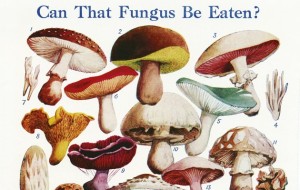On a busy night in downtown Asheville, countless chefs are unknowingly breaking the law.
A sushi restaurant serving wild mushroom rolls. An Italian eatery offering wild mushroom risotto. A Mexican restaurant with wild mushroom sopes listed on the menu.
 They’re all cashing in on a growing interest in foraged foods, where “wild” and “foraged” are menu buzzwords with the same cache in Asheville as “local.”
They’re all cashing in on a growing interest in foraged foods, where “wild” and “foraged” are menu buzzwords with the same cache in Asheville as “local.”
But not every “wild” mushroom you’ll find in a restaurant is really found in the forest. Some are farm-raised. And those chefs who serve legitimately foraged foods might find themselves on the wrong side of the health inspector.
That’s because in 2009 the North Carolina Department of Health and Human Services Division of Public Health declared wild mushrooms forbidden menu items, unless individually inspected by an approved mushroom-identification expert.
The problem lies in what exactly constitutes an “expert” in the state’s eyes.
“It’s illegal for restaurants in North Carolina to serve wild mushrooms because they have to come from an ‘approved source,’ which has to be an ‘expert’,” forager Alan Muskat said. “But they’ve never established what that means and how to become one.”
A wiry character widely known as the Asheville Mushroom Man, Muskat has foraged through farm and field with the Food Network’s Andrew Zimmern and other culinary cognoscenti. But Muskat is not officially certified as an expert and, to his knowledge, no one is. Not yet, anyway.
Identifying experts is the job of North Carolina’s newly-formed “Wild Mushroom Advisory Committee,” which is meeting to nail down state regulations governing wild mushrooms as their sales grow in response to demand.
The committee aims to determine who gets to become an expert and how, also working to offer guidelines so third parties can train hopeful foragers.
Muskat, who abandoned his business selling mushrooms to restaurants as his foraging tours have grown in popularity, has been asked to serve on that committee. “So basically, for 20 years, I’ve been breaking the law, and now they’ve asked me to help improve it,” he said.
The N.C. Department of Health and Human Services did not answer requests for information on how the process would work.
Dozens are sickened every year in Australia from consuming wild mushrooms.
